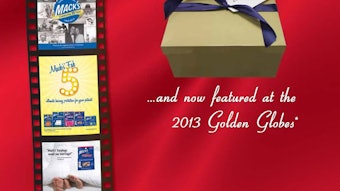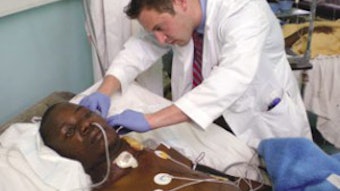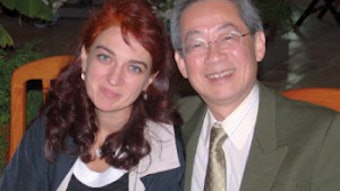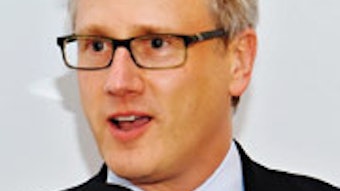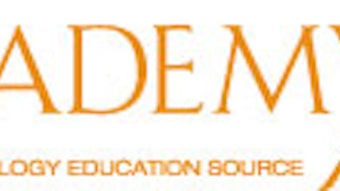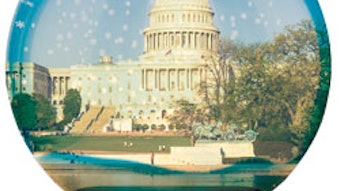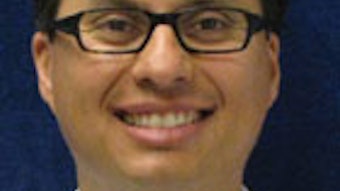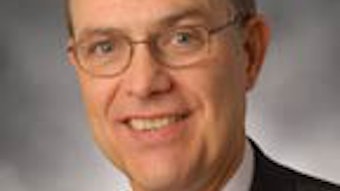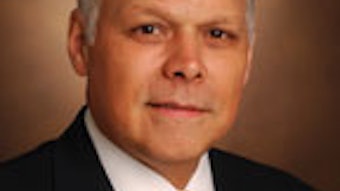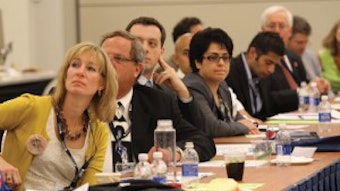After All, We Are All Humanitarians
Susan R. Cordes, MD, Vice chair, BOG Legislative Representatives Committee and chair, WIO Section It is human nature to be concerned about the welfare of others, and physicians seem to have a few exclamation points after the humanitarian gene. It sounds like a cliché when people say they want to be a doctor so they can help people, but it’s so true. We went to medical school and made countless personal and financial sacrifices so we could help other people through a profession that is known for altruism and compassion. Ask physicians who go overseas on humanitarian trips why they do it and a common answer is because it reminds them of why they went into medicine in the first place. Stripped of the paperwork, rules, regulations, and bureaucracy that come with practicing medicine in the United States, it is the opportunity to practice medicine at the core of what it is all about—caring for patients. Not every physician who wants to help is ready or able to jump on a plane to a far-away underdeveloped country, but there are many other ways to get involved in humanitarian efforts without ever leaving the office. For instance, the next time you trade in for new equipment, consider asking if the old equipment can be donated to an otolaryngology mission. Old, out-of-date equipment is often state-of-the-art and highly useful in a developing country. If you don’t know someone personally to give the equipment to, the Academy’s humanitarian efforts staff can facilitate getting the equipment to otolaryngologists traveling overseas. Another opportunity to help is through the Millennium Society. Your gift can be designated to benefit humanitarian outreach. Such money is used for a multitude of valuable programs, including grants allowing residents to participate in a mission trip. The benefits gained from your donation are exponential when you fund young, impressionable residents who will likely then participate in humanitarian efforts throughout their careers. Millennium Society gifts can also be used to fund a young otolaryngologist from a developing country to attend the AAO-HNSF Annual Meeting & OTO EXPOSM and gain experience in a U.S. otolaryngology program through the International Visiting Scholarship Program. Additional opportunities exist through Academy involvement. Consider joining the Humanitarian Efforts Committee. In addition to sponsoring miniseminars, this committee reviews resident travel grants, is working on a searchable database, has created disease-specific focus groups to develop best practices in humanitarian otolaryngology, and is involved in a host of other worthwhile activities. See more about the AAO-HNS/F Humanitarian Grant Winners in the March issue. By donating to the ENT PAC and/or attending the BOG Spring Meeting and the OTO Advocacy Summit May 5-7, 2013, we can advocate for the future of our specialty and preserve our ability to participate in humanitarian work. Increasing pressure from the government could threaten our financial ability to take time away from our practices in the United States so we can assist patients and otolaryngologists in less fortunate parts of the world. We must do all we can to preserve the reputation of our profession as honest, compassionate, and ethical in spite of the mischaracterization that occasionally appears in the media or legislative debate. Or, maybe it’s time to take that plunge and go on a mission trip, but it is difficult to know where to begin. Again, the Academy is an excellent resource. The Humanitarian Efforts page of the Academy website includes practical information and opportunities. In every issue of the Bulletin, otolaryngologists recount their experiences and provide a glimpse into the range of opportunities available. Finally, there are numerous otolaryngologists who have been providing humanitarian care in the U.S. and abroad, and a simple email or phone call is sometimes all it takes to get the process underway. That first step can be a difficult one to take, but the results can be amazingly gratifying. As physicians, we are fortunate to provide direct care to people in the course of our daily work; it is truly a gift to have the means, knowledge, and skill to be able to help people in our own communities and around the world. We should be proud of ourselves for using our gift wisely, but with talent comes responsibility. How we respond to that responsibility is what makes us unique individuals, but one thing we all have in common is that, at the end of the day, we are all humanitarians.
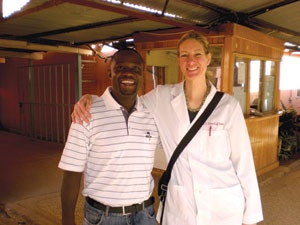 Henry Nono, MD, International Visiting Scholar, and Susan Cordes, MD, at Moi Teaching and Referral Hospital, Eldoret, Kenya, February 2012.
Henry Nono, MD, International Visiting Scholar, and Susan Cordes, MD, at Moi Teaching and Referral Hospital, Eldoret, Kenya, February 2012.Susan R. Cordes, MD, Vice chair, BOG Legislative Representatives Committee and chair, WIO Section
It is human nature to be concerned about the welfare of others, and physicians seem to have a few exclamation points after the humanitarian gene. It sounds like a cliché when people say they want to be a doctor so they can help people, but it’s so true. We went to medical school and made countless personal and financial sacrifices so we could help other people through a profession that is known for altruism and compassion. Ask physicians who go overseas on humanitarian trips why they do it and a common answer is because it reminds them of why they went into medicine in the first place. Stripped of the paperwork, rules, regulations, and bureaucracy that come with practicing medicine in the United States, it is the opportunity to practice medicine at the core of what it is all about—caring for patients.
Not every physician who wants to help is ready or able to jump on a plane to a far-away underdeveloped country, but there are many other ways to get involved in humanitarian efforts without ever leaving the office. For instance, the next time you trade in for new equipment, consider asking if the old equipment can be donated to an otolaryngology mission. Old, out-of-date equipment is often state-of-the-art and highly useful in a developing country. If you don’t know someone personally to give the equipment to, the Academy’s humanitarian efforts staff can facilitate getting the equipment to otolaryngologists traveling overseas.
Another opportunity to help is through the Millennium Society. Your gift can be designated to benefit humanitarian outreach. Such money is used for a multitude of valuable programs, including grants allowing residents to participate in a mission trip. The benefits gained from your donation are exponential when you fund young, impressionable residents who will likely then participate in humanitarian efforts throughout their careers. Millennium Society gifts can also be used to fund a young otolaryngologist from a developing country to attend the AAO-HNSF Annual Meeting & OTO EXPOSM and gain experience in a U.S. otolaryngology program through the International Visiting Scholarship Program.
Additional opportunities exist through Academy involvement. Consider joining the Humanitarian Efforts Committee. In addition to sponsoring miniseminars, this committee reviews resident travel grants, is working on a searchable database, has created disease-specific focus groups to develop best practices in humanitarian otolaryngology, and is involved in a host of other worthwhile activities. See more about the AAO-HNS/F Humanitarian Grant Winners in the March issue.
By donating to the ENT PAC and/or attending the BOG Spring Meeting and the OTO Advocacy Summit May 5-7, 2013, we can advocate for the future of our specialty and preserve our ability to participate in humanitarian work. Increasing pressure from the government could threaten our financial ability to take time away from our practices in the United States so we can assist patients and otolaryngologists in less fortunate parts of the world. We must do all we can to preserve the reputation of our profession as honest, compassionate, and ethical in spite of the mischaracterization that occasionally appears in the media or legislative debate.
Or, maybe it’s time to take that plunge and go on a mission trip, but it is difficult to know where to begin. Again, the Academy is an excellent resource. The Humanitarian Efforts page of the Academy website includes practical information and opportunities. In every issue of the Bulletin, otolaryngologists recount their experiences and provide a glimpse into the range of opportunities available. Finally, there are numerous otolaryngologists who have been providing humanitarian care in the U.S. and abroad, and a simple email or phone call is sometimes all it takes to get the process underway. That first step can be a difficult one to take, but the results can be amazingly gratifying.
As physicians, we are fortunate to provide direct care to people in the course of our daily work; it is truly a gift to have the means, knowledge, and skill to be able to help people in our own communities and around the world. We should be proud of ourselves for using our gift wisely, but with talent comes responsibility. How we respond to that responsibility is what makes us unique individuals, but one thing we all have in common is that, at the end of the day, we are all humanitarians.
